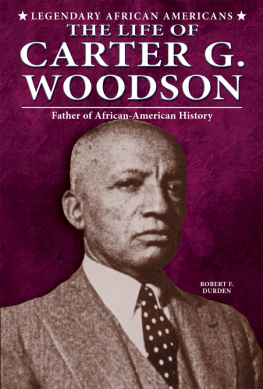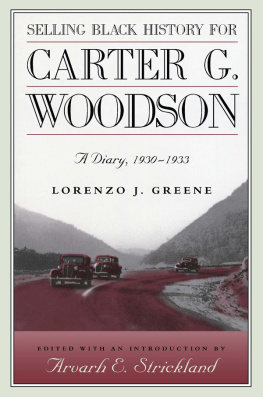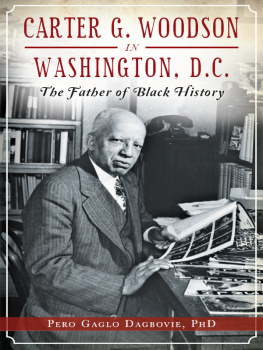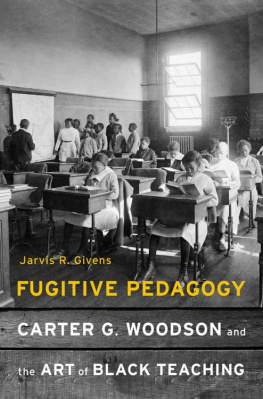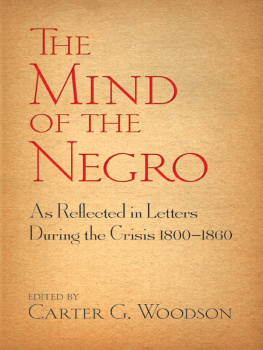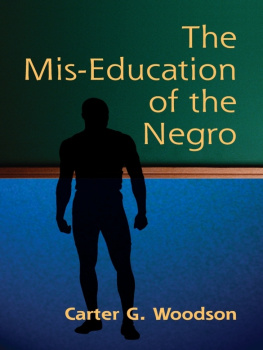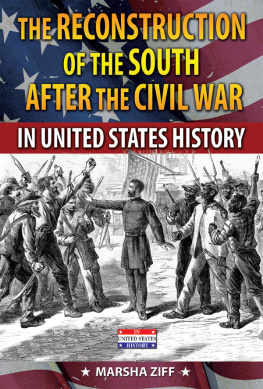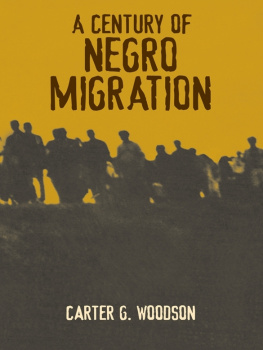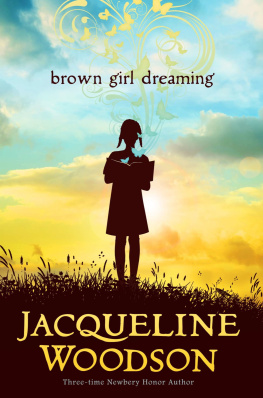Carter G. Woodsons Historic Life
Carter G. Woodson, born just ten years after the Civil War ended, grew up in the lingering shadow of slavery. Woodson soon realized that African-American history was not taught anywhere in the United States. He devoted his life to discovering, teaching, and writing the story of his people. In doing so, he opened up a whole new field of American historyAfrican-American history. Today, because of the untiring efforts of this one man, Black History Month is celebrated annually, and African-American history is a well-respected field of study.
Author Robert F. Durden tells the inspiring story of this pioneering historian. During Woodsons life, he established a journal, an association, and a publishing company. These gave African Americans, so long ignored and misrepresented, a voice and their rightful history.
interesting enough to hold the attention of all readers.
The Book Report
a must-purchase item.
National Association of Multicultural Education
ABOUT THE AUTHOR
Robert F. Durden was a professor emeritus of history at Duke University. He published many scholarly books and articles.


Image Credit: National Archives
Carter G. Woodson devoted his life to discovering, teaching, and writing the story of the African-American people.
Many of the leading African Americans of the nation, along with their white friends and supporters, gathered in Chicago in June 1926. The occasion was the seventeenth annual meeting of the National Association for the Advancement of Colored People, the NAACP. It had been founded in 1909one hundred years after the birth of Abraham Lincolnby a mixed group of whites and blacks. They were angry and saddened about the rising tide of white racism and anti-black feeling in the country. The NAACP was the first major organization established to protest and fight against widespread injustice to African Americans.
In 1914, the NAACP began giving an annual award to the African American who had reached the highest achievement in his [or her] field of activity. The award consisted of a gold medal and a certificate, and it was named for Joel E. Spingarn. He was not only one of the founders of the NAACP, but also one of the leaders in the organizations successful battles in the courts to win greater justice for African Americans.
The awarding of the Spingarn Medal had come to be one of the highlights of the NAACPs annual meeting. Among the earlier winners were such outstanding African Americans as George Washington Carver, a famous scientist; W. E. B. Du Bois, a prominent writer and scholar; and James Weldon Johnson, a poet. Who would win the Spingarn Medal in 1926?
The assembled crowd soon learned that the winner was Carter Godwin Woodsoneducator, scholar, and author. Addressing Woodson, the speaker presented the medal as testimony of the honor in which you are so deservedly held by your fellows of both races.... Woodsons labors for the truth had earned him the recognition.
When Carter Woodson won the Spingarn Medal, he was fifty years old and at the peak of his career. The award no doubt meant a great deal to him, for in some ways he led a lonely life. He never married. That meant he lacked the support that being a part of a family can bring. He was so completely wrapped up in his work that, in a way, he was married to his job.
Born in Virginia in 1875, Carter Woodson was the son of parents who had been slaves in Virginia before the Civil War. Their lives had been hard, both before and after the war. In many ways, Carter Woodsons life was hard also. His family, like most African-American families after the Civil War, was poor. There were times when the Woodson family did not even have enough food to eat.
The Woodsons raised young Carter and his brothers and sisters to have strong moral values. They were faithful Baptists and went regularly to church and Sunday school. Along with religion, Carters parents placed much importance on education. They saw to it that their children took school seriously.
Carter Woodson had to scramble hard to get a proper education. It took a lot of doing, but, in addition to the Spingarn Medal, he ended up with a special claim to fame. He was the first and only African American with once-enslaved parents to receive the highest degree in the field of history that is offered by American universitiesthe doctor of philosophy, or Ph.D., degree.
Born just ten years after the Civil War ended, Carter Woodson grew up in the lingering shadow of slavery. He also heard many stories about slavery from his parents and grandparents. These stories deeply interested him and helped spark his passion for African-American history.
How did it happen that the son of former slaves won such an important award in 1926? What had Carter G. Woodson done to bring himself this recognition? How did he come to be called the Father of African-American History?
When the Civil War ended in 1865, freedom finally came to the four million or so African Americans who had been slaves in the southern part of the United States. Many of them, like Carter G. Woodsons father, were proud of the part that they had played in winning freedom.
As the years passed, white Americans gradually forgot or ignored the fact that African Americans had helped, in a big way, to win the war for the United States (the North) and to end slavery. African Americans, however, did not forget. Certain leaders, such as Carter G. Woodson, worked hard to have the truth about the African-American role in the Civil War told and written down. They wanted to make sure that someday the full, true story would be known.
Before the Civil War, Woodsons father, James Henry Woodson, was a slave on a plantation on the James River, some seventy-five miles west of Richmond, Virginia. In 1850, the plantation was home to the Woodson familyCarter Woodsons grandfather and grandmother; his father, James Henry; and four other Woodson childrenplus fifteen other slaves. The slaves worked at many chores but mostly as field hands in the growing of wheat, corn, oats, and tobacco.
Woodsons father and grandfather were skilled carpenters in addition to being field hands. Since they could make useful things like oxcarts, wagons, and furniture, their owner often hired them out to white neighbors. The neighbors, in turn, paid the owner for the service of his slaves. There is evidence that Woodsons grandfather, father, and uncles were not always mild and obedient slaves. They sometimes resisted when they thought they were being treated unfairly or too harshly.
During the Civil War, James Henry Woodson was hired out to a man who made him dig ditches, among other tasks. He used whatever free time he had, however, to make fish traps and small items of furniture. These he would sell to get pocket change so that he could buy little treats for himself and for his parents. One day the man who had hired James Henry Woodson saw him making some wooden object. The man became angry and tried to whip him. James Henry Woodson hit the manand then fled back to his owners place.
Seeing his slave back at home, the owner asked, What are you doing here at this time of day? James Henry Woodson explained that he and the man who had hired his services fell out. That is, they had a quarrel. Fell out! Thats the trouble now! All free! All free, the slave owner declared angrily. Yes, we are free, James Henry Woodson shot back. And if you bother me, Ill kill you, another devil.

